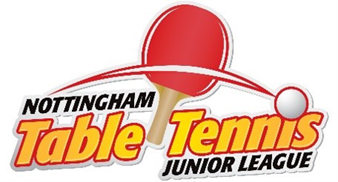The Nottingham Junior League continues to be a successful venture in providing local, low cost and meaningful match play for children in and around Nottingham. This year, the eighth year, has seen record numbers with over 100 children signing up.
Following the final round and presentations on 13th May, Chris Turner reflects on the progress the league has made since its inception and considers some of the key success factors that have influenced its popularity. As well as being Area Manager for the East for Table Tennis England, Chris is also a volunteer organiser of the Nottingham Junior League.
One of the key differences compared to other junior league-type events is that children enter as individuals instead of as part of a team. This removes barriers to children finding team-mates and clubs being responsible for sorting teams out and entering.
As well as this, it also opens the league to children who are perhaps not members of a club but play as part of an after-school or curriculum session. Schools can be very good at promoting the event. Many of these children do then join a club to get better during the league season, so the easy-to-enter factor is a key element. It’s not a league for clubs, but for children.
We run two events, one for secondary school students in the morning and primary school children in the afternoon. We chose to do afternoons for primary school children knowing that many children do other activities on a Saturday morning so this way we’re not asking children to choose. Many children turn up and play in their football kit.
Competition Format
Children are put into divisions of 5-6 players (5 is the ideal number) and they play three sets of table tennis (not best of) against each other player in their group. A point is awarded for each set won with winners moving up to a higher division for the next round and players coming bottom moving down. Where players are tied on points it’s the winner on that day that decides the final position.
Overall, there are six rounds, roughly once per month. The first four are promotion and relegation and the last two rounds, points are combined to decide final placings.
Key Elements for Success
Marketing
We have an electronic online form as well as a paper copy. If you can, ask a school if their reprographics department will print these for you as it will be much cheaper than a commercial printer and much quicker than doing it yourself.
You must keep reminding the kids and their parents and not just give out a form or send an email. Often it will take 3-4 forms per child, especially in the beginning.
It’s okay to start small
The first year of the Nottingham Junior League started with less than 30 children and we were fortunate enough to obtain a private sponsor who believed the league would be successful and wanted to ensure we didn’t make a loss and the children received nice trophies.
It’s far better to just start small and risk making a loss than it is to cancel and start again. Word of mouth will grow the event year on year. Already for next season starting in November 2023 we have close to 30 children signed up.
It’s also okay to have the event in just the afternoon, with secondary school children on some tables and primary on the others. It’s better to be busy and to have an atmosphere than it is without.
Nice trophies
One of our non-negotiables is have nice glass trophies which are displayed on the final round. All children also get a medal and pose for a photo in their division. The extra investment in trophies is well worth it and elevates the experience for children. It also helps with word of mouth amongst parents.
Parent experience
Although not possible everywhere, we ensure we put refreshments on such as toasties and hot drinks. By running an event in the afternoon, parents have often been at other sporting events so this can be their lunch! It also brings in a nice revenue stream.
A parent, or several, may offer to do this in return for their child having a free entry. What they’ll generate is more than the entry fee.
Communication
Do ensure you send out an email to participants about a week or so before to remind them and ask them to let you know if they can’t make it or will be late. Time can be lost at the start wondering if a child is coming or not when they might have another event finishing a little late. Being a round-robin these matches can be shifted around to ensure the event starts promptly.





